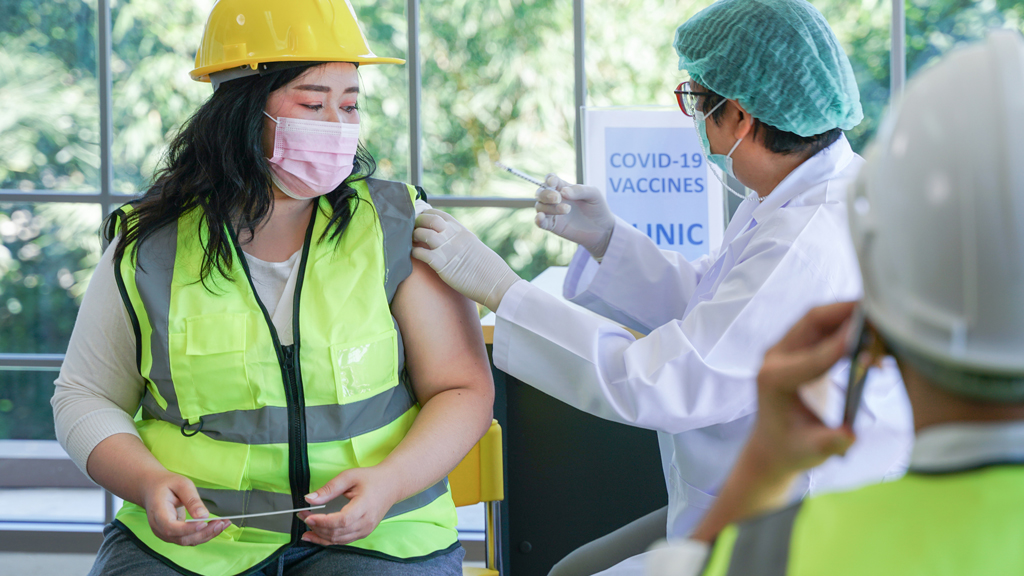Momentum seems to be growing for widespread adoption of mandatory vaccine policies at Ontario construction workplaces and jobsites.
Two of Canada’s largest construction employers, EllisDon and PCL, have jointly announced they will require their employees to be fully vaccinated, and a residential construction executive suggested a precedent is being set.
“It seems like every day you see more employers taking a stand when it comes to being vaccinated,” said Andrew Pariser, vice-president of the Residential Construction Council of Ontario (RESCON).
“Essentially, someone has to go first, and whoever goes first, it will start to set the precedent.
“That being said, everybody seems to be moving closer and closer.”
EllisDon and PCL announced their policies Sept. 14, stating that as of Nov. 1 they will require Canadian employees working at any location on company business to be fully vaccinated against COVID-19, with a few exemptions outlined.
EllisDon launched rapid antigen testing at its jobsites last February but as of November, its recent statement said testing will not be offered as an alternative to full immunization.
PCL’s president and CEO Dave Filipchuk commented in the statement, “We are especially pleased to participate in this initiative with EllisDon, a respected industry peer. It is our hope that most general contractors and subtrade partners across Canada will soon join us.”
Geoff Smith, president and CEO of EllisDon, stated, “Protecting and taking care of each other, and our families, speaks directly to the values we champion at EllisDon each and every day.”
Pariser was speaking on behalf of eight Ontario contractor associations, announcing a survey of the construction sector to determine how many workplaces have a vaccination policy in place and gather information on barriers to vaccine adoption.
He said the construction sector adopted a “continuous improvement model” in March 2020 to deal with the pandemic and currently, the three options contractors have available are vigorous promotion of testing; mandatory vaccines but with rapid testing of unvaccinated workers; or the “mandatory, mandatory” option announced by PCL and EllisDon.
“What we’re doing is, we’re going to outline the legal and practical realities of picking an option,” said Pariser of the survey, which is to be completed by the end of September. “The goal is to provide the information to our members so that they can assess their individual demands and make the best decision for their workforce.”
With major employers outside the construction sector such as the Cities of Toronto and Ottawa and the Toronto Transit Commission announcing mandatory vaccine policies, the trend is gaining strength, Pariser said.
“If you go back a month to where we were as a province and an industry, we’ve moved leaps and bounds. COVID’s been an evolution,” he said.
“We’ve also had a large number of unions come out, in and out of construction. They’re doing more and more to promote vaccines, but then also more seriously looking at supporting mandatory vaccination.”
Both Pariser and Erich Schmidt, manager of public affairs for the Ontario General Contractors Association (OGCA), one of the associations supporting the vaccine survey, noted construction workplaces are diverse and one policy may not work for all employers. An OGCA statement said the association has been working to inform general contractors about site-specific vaccine requirements and that a review of a worker’s proof-of-vaccination certificate may be a requirement for entering sites.
“We see this currently to be an owner’s issue,” said Schmidt. “At this time, we are seeing numerous purchasers of construction requiring mandatory vaccination on their site. One of the issues that we are facing is that we don’t really have an idea of what the labour pool looks like of individuals who are vaccinated, so, we can’t at this current time promote a vaccine mandate when we don’t know how many construction workers have been vaccinated.”
The survey is an example of the collaboration and research that need to take place to ensure the associations have a good picture of what vaccination rates look like before steps are taken regarding mandatory vaccination, Schmidt said.
The sponsors of the survey are RESCON, the OGCA, the Ontario Sewer and Watermain Construction Association (OSWCA), Ontario Residential Council of Construction Associations, Heavy Construction Association of Toronto, Ontario Home Builders’ Association, Ontario Road Builders’ Association, and Toronto and Area Road Builders Association.
The survey consists of 10 questions and respondents are anonymous.
“Good decisions require good information,” said OSWCA executive director Patrick McManus in a statement. “Construction’s strength has been our ability to come together and work together to address the health and safety concerns affecting our members, their staff and the construction industry as a whole.”
Representatives of several construction unions did not respond to requests for comments. LIUNA spokesperson Victoria Mancinelli said in a statement regarding employers’ jobsites, “We will be assessing policies as they are announced and will also be assessing how they may impact our members on a case-to-case basis.”
Pariser noted while there is no union representation on the coalition undertaking the vaccine survey, there is continuing consultation.
“We can’t minimize the importance of the joint health and safety committee on each site. And the unions obviously play a huge role there. So just because they’re not involved in this effort doesn’t mean we’re not working together.”
Follow the author on Twitter @DonWall_DCN.











Recent Comments